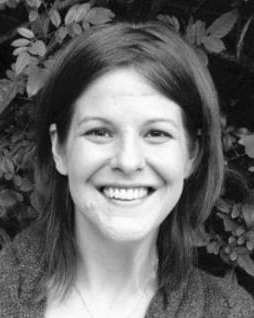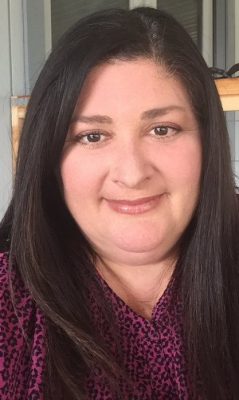
By Mike Kilen
GCU News Bureau
When April X. Castillo looked at the test, panic set in.
Subject-verb agreement? Prepositions?
The worst part of the test’s grammar section for the would-be nurse was “pretty much all of grammar,” she said. “Apparently, I didn’t know how to do English.”

But the worst part was that she couldn’t advance into the nursing program at Grand Canyon University without passing that admission assessment test called HESI A2. She had failed it twice.
That’s when she remembered Dr. Jennifer Santos, Associate Professor of English at GCU.
“I think she is an angel sent from God,” Castillo said.
Castillo thinks this because her very first class at GCU was with Santos. English is Castillo’s second language, after Spanish, and she learned a lot in her freshman class. But this nursing test … it was so hard, she had switched majors to Communications because she couldn’t pass it.
Santos talked with Castillo and found her demoralized because she was unable to fulfill her dream of being a nurse. Santos wanted to help and started by looking at sample HESI tests.
“Oh my gosh, this is hard, even for people who are trained in this,” she said.
Direct and indirect objects and predicate nominatives filled the pages.
“Predicate nominative?” Santos asked. “Really?”
It even could make the blood rush to an English major’s face.
“If anything, I thought anatomy would stop me,” Castillo said. “Never in a million years would I have thought it would be grammar.”
So the two began to cram. And cram.
“She didn’t have to do this – I wasn’t even a student of hers. But she took me in as if I was her daughter,” Castillo said.
The student who wasn’t getting credit for their weekly office meetings and the professor who wasn’t get paid for it became a team.
Castillo passed the test on the third try and began her nursing studies.
That was more than four years ago. Word got around. More students, most of whom consider English their second language, showed up at Santos’ office door. Many were also worried about the exam’s sections on grammar, vocabulary and comprehension.
“Writing and communication is important in the profession of nursing for caring for patients and working in a health care organization,” said Trina Staton, Associate Dean of the Pre-Licensure BSN Program in the College of Nursing and Health Care Professions. “Writing, grammar and communication is especially important at the baccalaureate level of accreditation in preparing nurses.”

Luckily, there was another English professor right next door to Santos.
“I am the grammar crazy person,” said Dr. Heather Brody.
Brody told Santos the amount of office time she was volunteering to help the students pass this test was insane, so she offered a solution. Get them all together in a weekly class, and she would join the effort.
“We felt strongly they would be great nurses, so it didn’t feel like a choice but a necessity,” Brody said. “They want to be nurses so desperately and know this is an obstacle in the way, so we will fight for them and do what needs to be done.”
They devised homework and lessons to counter what Brody calls a flood of incorrect usage fostered by our breezy online culture, which makes it even harder for non-native students.
Every week, the students arrived eager, even asking for more homework.
“No one is going through the motions,” Santos said.
They learned from each other. For example, the English professors were trying to describe the difference between directive and conditional imperatives, and a light bulb went on for a nursing student.
“Like a hypothesis?” she asked.
Exactly. Santos and Brody have been using that left-brain friendly explanation ever since.
Among the more than 30 students who have come through Santos and Brody’s HESI prep meetup was Natalia Pacheco. She came in upset.
“My first language is Spanish,” she said. “You know how English has special rules? You only do this for that? Oh, gosh.
“I would cry. She would say, ‘It’s OK, don’t be desperate.’”

Pancheco was grateful that the professors took their time between their own classes to teach them. She passed the test, like every student who has stuck with the lessons. She sailed through the nursing program, graduated in April and is preparing for the national licensing exam (NCLEX) to begin her nursing career.
“But that doesn’t have grammar on it,” Pacheco said.
She almost wishes it did.
The duo of English department grammar gurus are delighted to see these results as they continued to meet every Monday on Zoom through the pandemic and the following months.
“HESI is one of my favorite parts of the week,” Santos said. “It is so rewarding.”
Especially when they see their first students begin to display their passions in nursing jobs.
“We would feel confident going into the hospital having any one of them be our nurse with their level of commitment,” Brody said.
Castillo graduated in December 2019 and now works at Abrazo West, an acute-care hospital in Goodyear. She was on the front lines during the COVID-19 crisis.
“I went into nursing to have the ability to help others. Now that I’ve been in it, there is great satisfaction. I see people in their worst times, and I see them recover,” she said. “It’s beautiful. During COVID, I saw people being reunited with their families. Nothing else could give me that type of feeling.”
Every day, Castillo said, she still thinks of Santos, who told her about common errors with comma splices and apostrophes, among other tricks of the language.
“I don’t think I would be a nurse if it wasn’t for her,” she said.
Grand Canyon University senior writer Mike Kilen can be reached at [email protected] or at 602-639-6764.
****
Related content:
GCU Today: GCU students earn 100% NCLEX first-time pass rate
GCU Today: Peer mentors bring experience to composition class



































































